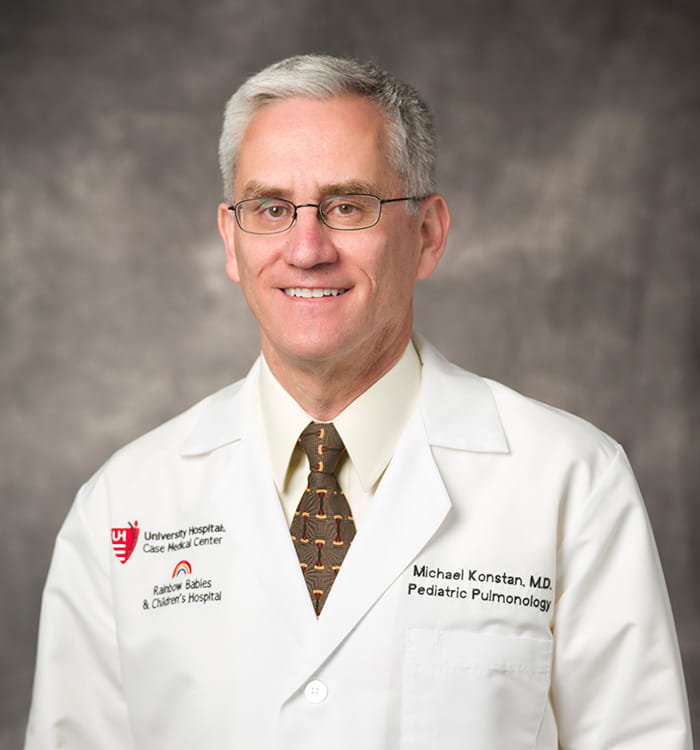Cystic Fibrosis Program Update
February 27, 2022
Innovations in Pulmonary & Sleep Medicine | Winter 2022
The LeRoy W. Matthews Cystic Fibrosis Care Center at University Hospitals Rainbow Babies & Children’s Hospital was one of the first Cystic Fibrosis (CF) centers established in the U.S., now serving approximately 300 adults and children regionally
CF is an incurable genetic condition affecting approximately 70,000 people worldwide and 32,000 people in the U.S. Mutations in a single gene, the CF Transmembrane Conductance Regulator (CFTR), cause dysfunction of the CFTR protein responsible for maintaining proper salt and water balance in tissues throughout the body.
University Hospitals Rainbow Babies & Children’s Hospital and University Hospitals Cleveland Medical Center are committed to expanding the available knowledge of CF and identifying novel therapeutic options by participating in relevant research studies.
 Alex Gifford, MD
Alex Gifford, MD“University Hospitals has a long history of providing innovative therapies to people with CF,” says Alex Gifford, MD, Director of the Adult Cystic Fibrosis Program at University Hospitals Cleveland Medical Center and Director of the Cystic Fibrosis Therapeutics Development Center in the Leroy W. Matthews Cystic Fibrosis Center at University Hospitals Rainbow Babies & Children’s Hospital. “We belong to the Therapeutics Development Network, a consortium of academic medical centers sponsored by the CF Foundation, to perform cutting-edge clinical trials.”
Rich history of leadership in CF Care
 Michael Konstan, MD
Michael Konstan, MDThe LeRoy W. Matthews Cystic Fibrosis Center was named after the founder of the center, a visionary physician-scientist who in the late 1950s established one of the first comprehensive care clinics in the country for the treatment of CF. By the early 1960s, survival of patients with CF, mostly young children back then, was markedly greater in Cleveland than anywhere else in the U.S., and patients flocked from many states to receive their CF care at UH Rainbow Babies & Children’s Hospital. In 1998, Michael Konstan, MD, the Austin Ricci Chair in Pulmonary Care and Research at University Hospitals Rainbow Babies & Children’s, was one of the 7 founders of the CF Foundation’s Therapeutics Development Network. Now 91 center strong, this network led clinical trial participation for nearly every approved CF drug, and Dr. Konstan led several of the seminal trials. Due in part to Dr. Konstan's research and to his leadership inspiring and facilitating others' efforts, the predicted survival age of patients with CF nationwide has increased from age 30 to 50 years over the last 2 decades.
CFTR Modulators
University Hospitals Rainbow Babies & Children’s has participated in multiple clinical trials testing the efficacy of drugs that improve salt and water balance in body tissues by restoring function of the CFTR protein. CFTR modulators significantly improve lung function, reduce the frequency and severity of pulmonary exacerbations, and improve patients’ nutritional status, which is often compromised because of pancreas dysfunction and poor absorption of nutrients.
“We’ve seen dramatic clinical improvements in the health of people with CF treated with CFTR modulators,” Dr. Gifford says. “The benefits of restoring CFTR function have translated well from clinical trials to clinical practice.”
Antibiotic-resistant infections
University Hospitals is involved in trials evaluating anti-infective therapies to treat people with CF who have infections caused by antibiotic-resistant pathogens.
“We’re always looking for new strategies to combat infections,” Dr. Gifford says. “One of the approaches currently being tested is the use of intravenous gallium, an element with properties similar to iron, to block the growth and reproduction of bacteria.”
Another novel approach to treating antibiotic-resistant infections is to use bacteriophages — viruses that infect bacteria.
“We are figuring out how to harness naturally occurring bacteriophages to kill bacteria, such as Pseudomonas aeruginosa, that become resistant to antibiotics over time,” Dr. Gifford says. “We plan to participate in an upcoming bacteriophage clinical trial involving patients with CF and drug-resistant microbial infections.”
Gene therapy
“CF is caused by mutations in the CFTR gene that cause both qualitative and quantitative dysfunction in epithelial cells,” Dr. Gifford says. “If we can insert copies of normal CFTR DNA into these cells, they might start making CFTR protein that works normally, which should improve lung health.”
“Gene therapy strategies hold promise for the roughly 5 to 10 percent of CF patients who are not candidates for CFTR modulators,” he says. “An upcoming clinical trial will evaluate the safety and efficacy of inhaling normal CFTR DNA packaged in a non-infectious viral particle.”
Biological markers of CFTR function
University Hospitals Rainbow Babies & Children’s has been enrolling adults and children with CF in a large study designed to understand natural variations and the effects of CFTR modulator treatment on sweat chloride levels, the biological marker of CFTR function used to screen for the disease.
“Although we have used sweat chloride as a diagnostic test for CF since the late 1950s,” Dr. Gifford says, “we have much to learn about its utility as a biological marker of CFTR function.”
Excellence in Cystic Fibrosis Care
“Patients followed at our CF Center benefit in many ways from the close integration of our clinical and research teams,” Dr. Gifford says. “These teams routinely communicate with each other and work together during weekly adult and pediatric CF clinics.”
Data from the Cystic Fibrosis Foundation Patient Registry has shown a steady increase in median survival of patients over time.
“We are seeing unprecedented longevity,” he says. “I think this trend reflects many innovations, including a multidisciplinary care model, medications that treat lung infections and increase lung function by clearing mucus from the lungs, and pancreatic enzymes that improve nutrition.”
“If you have patients with CF who are interested in a clinical trial at University Hospitals Rainbow Babies & Children’s, please reach out to us,” Dr. Gifford says. “We will connect them with members of our research team who can provide additional information.”
For more information about the CF program or clinical trials, call Dr. Gifford at 216-286-7205.
Contributing Expert:
Alex Gifford, MD,
Director, Adult Cystic Fibrosis Program
University Hospitals Cleveland Medical Center
Director, Cystic Fibrosis Therapeutics Development Center
Leroy W. Matthews Cystic Fibrosis Center
UH Rainbow Babies & Children’s Hospital
Clinical Associate Professor of Medicine
Case Western Reserve University School of Medicine


